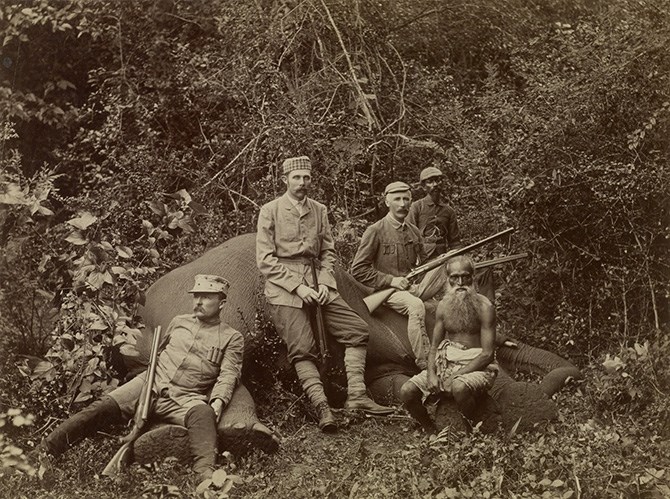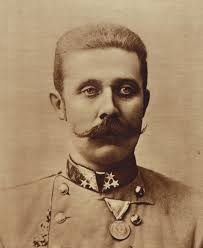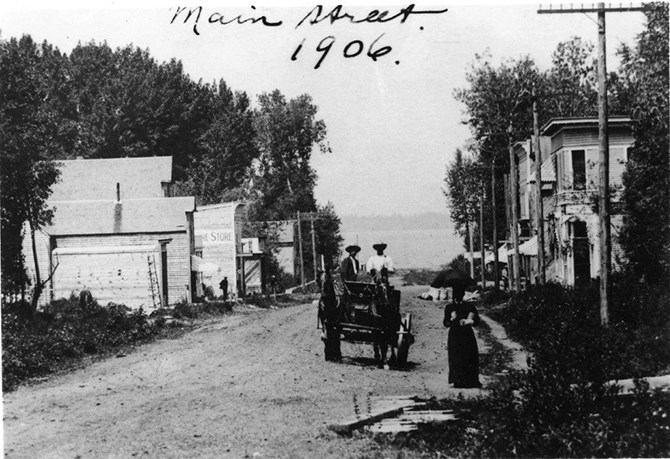
Franz Ferdinand's hunting elephants in Ceylon in January, 1893.
Although the Archduke is reputed to have killed more than 280,000 animals in his lifetime, he failed in his bid to shoot a grizzly while hunting in the Okanagan in September, 1893.
Image Credit: Wikimedia commons
April 01, 2017 - 6:30 PM
PART THREE OF A FOUR PART SERIES
A CASE OF THE SNIFFLES GETS WORSE AND THE ARCHDUKE MUST SHORTEN HIS TRIP
The Archduke Ferdinand’s native guides suggested an early start to hunting efforts prior to turning in the night of Sept. 12, 1893.
They urged Ferdinand to continue up the Shingle Creek watershed towards Black Mountain, which Maurice Williams, a history professor emeritus from UBCO, believes is known today as Brent Mountain, suggesting a 4 a.m. departure for the hunting party.
Ferdinand expressed his frustration at the natives once more in his journal the following day, Sept. 13, when the natives failed to get moving before 7 a.m., laughing off the urging of Ferdinand and his fellow hunters.
The day’s trek involved some rough going over paths only a foot wide, in addition to climbing steep slopes.
The pace added to Ferdinand’s frustration. The heir to a European empire was clearly more accustomed to people taking his orders.
"Unfortunately there existed no means to incite these phlegmatic people apart from the fact that any use of force probably would have only the opposite effect. There was nothing left than exercise ourselves in patience.”
Ferdinand hoped his hunt would reward him with a grizzly. One historical account suggests he travelled as far as the Ashnola Valley in the Similkameen, a notion dissuaded by Williams, who says the party couldn’t have travelled that far in their four-day trip.
The party sighted bear tracks, but never came close to shooting one, let alone a grizzly.
“It wasn’t much of a hunting trip. He was after grizzly bear, but ended up with a few deer and a bunch of grouse,” Williams notes.
Ferdinand, led by his personal native guide who went by the name Charley, managed to shoot a deer and some quail before meeting up with the pack train around noon on Sept. 13. Once the natives got back to camp, they didn’t want to go out hunting again.
READ PART TWO OF THE SERIES HERE:
Penticton pioneer Tom Ellis fails to impress Austrian Archduke
OH, THE IRONY
The man credited with the slaying of 280,000 animals in his lifetime took a moment to complain about the environmental degradations of others.
He wrote that vast tracts of land had been burned over, commenting that “not only Indians, railway workers and colonists had created these destructions, but also the gold diggers of this region… they burn the wood to be able to examine the ground more closely.”

Archduke Franz Ferdinand
Image Credit: Wikimedia commons
The comments were similar to those he made of Vancouver, where he had visited prior to his Okanagan journey.
His observations of the fast growing city on the coast included what he saw as the settlers' devastation of the coastal forest there:
"The most gorgeous wood that would represent a fabulous value at home is used here to almost exclusively as fuel for locomotives. In most cases a forest is burned down as the saw and the ax are not working fast enough. It hurts to see these mighty patriarchs of the wood be destroyed in vain and on thousands of hectares to see only the remains of former beautiful stocks as withered trunks rising into the sky that are charred at the bottom."
That night, camp was made on higher ground, where Ferdinand complained of an icy wind that blew mercilessly from nearby snow fields.
The next morning, Ferdinand was dissuaded from further hunting by other members of his party. He’d been suffering a cold that worsened considerably following the bitter night on Brent Mountain.
The hunting party began making their way back to the Shingle Creek camp, hunting along the way. They made camp at the site they’d used two nights before and spent the evening cooking a six-course meal that Ferdinand wrote, “in our view, tasted better in the wilderness than the finest dinner at Sacher.”
AN ARCHDUKE'S OBSERVATIONS OF AN INDIAN VILLAGE
The next morning, the hunting party made their way back to Penticton Indian village in an easy, relaxed fashion, taking photographs in the morning under sunny skies and warm temperatures.
Ferdinand’s native guide, Charley, invited him into his home on the west side of the Okanagan River. Inside, Ferdinand found Charley’s "very corpulent better half who was wearing some sort of negligee and carried a child on her back in a canvas strap.”
The Archduke was flabbergasted to find a sewing machine, coffee mill and walls plastered with newspapers rather than weapons, hides and scalps of slain enemies. He also observed Charley’s eldest daughter at work on the sewing machine.
Ferdinand also took note in his journal the "natives did apparently not consider cleanliness highly," as he refused to touch the “objects which made me curious,” and "soon left the living room from the sticky air.”
The Archduke eventually crossed the river, making his way down to the Okanagan Lake waterfront where the Aberdeen had tied up at 5 that afternoon. He climbed aboard and not long afterward retired for the evening.
Next: A final meeting with Penticton pioneer rancher Tom Ellis provides us with an insight into the Penticton pioneer ranchers’ personality.

Penticton's Main Street in 1906. Thirteen years after the Archduke's visit to the community, little had changed as plans for an American rail link, talked about during Ferdinand's 1893 visit, never materialized.
Image Credit: Penticton musum and Archives
To contact a reporter for this story, email Steve Arstad or call 250-488-3065 or email the editor. You can also submit photos, videos or news tips to the newsroom and be entered to win a monthly prize draw.
We welcome your comments and opinions on our stories but play nice. We won't censor or delete comments unless they contain off-topic statements or links, unnecessary vulgarity, false facts, spam or obviously fake profiles. If you have any concerns about what you see in comments, email the editor in the link above.
News from © iNFOnews, 2017